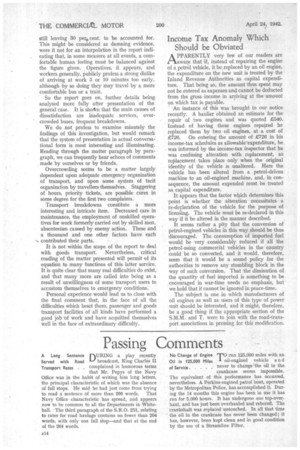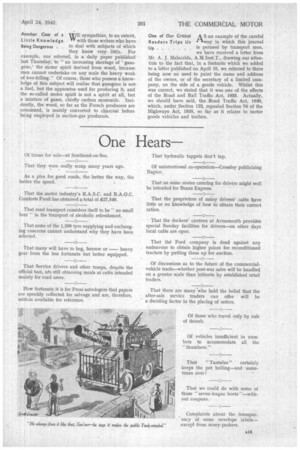Passing Comments
Page 16

Page 17

If you've noticed an error in this article please click here to report it so we can fix it.
DURING a play recently broadcast, King Charles II complained in humorous terms that Mr. Pepys of the Navy Office was in the habit of writing him long letters, the principal characteristic of which was the absence of full stops. He said he had just come from trying to read a sentence Of more than 200 words. That Navy Office characteristic has spread, and appears now to be common to all the Departments in Whitehall. The third paragraph of the S.R.O. 251, relating to rates for road haulage contains no fewer than 204 words, with only one full stop—and that at the end of the 204 words. A Long Sentence Served with Road Transport Rates . rrun 125,000 miles with an oil-engined vehicle and never to change the oil in the crankcase seems impossible. The equivalent of this performance has occurred, nevertheless. A Perkins-engined patrol boat, operated by the Metropolitan Police, has accomplished it. During the 14 months this engine has been in use it has run for 5,000 hours. It has undergone one top-overhaul, and has just been overhauled and rebored. The crankshaft was replaced untouched. In all that time the oil in the crankcase has never been changed; it has, however, been kept clean and in good condition by the use of a Streamline Filter.
No Change of Engine Oil in 125,000 Miles of Service
Another Case of a WE sympathize, to an extent, Little Knowledge VY with those writers who have Being Dangerous . to deal with subjects of Which
they know very little. For example, one referred, in a daily paper published last Thursday, to " an increasing shortage of gasogene,' the motor spirit derived from wood, because men cannot undertake on any scale the heavy work of tree-felling." Of course, those who possess a.knowledge of this subject will realize that gasogene is nota fuel, but the apparatus used for producing it, and the so-called motor spirit is not a spirit at all, but a mixture of gases, chiefly carbon monoxide. Incidently, the wood, so far as the French producers are concerned, is mainly converted to charcoal before being employed in suction-gas producers.
One of Our Critical A S an example of the careful Readers Trips Us Amway in which this journal
Up is perused by transport men, we have received a letter from Mr. A. J. Malacrida, A.M.Inst.T., drawing our attention to the fact that, in a footnote which we added to a letter published on April 10, we referred to there being now no need to paint• the name and address of the owner, or of the secretary of a limited company, on the side of a goods vehicle. Whilst this was correct, we stated that it was one of the effects of the Road and Rail Traffic Act, 1933. Actually, we should have said, the Road Traffic Act, 1930, which, under Section 122, repealed Section 76 of the Highways Act, 1835, so far as it relates to motor goods vehicles and trailers.




















































